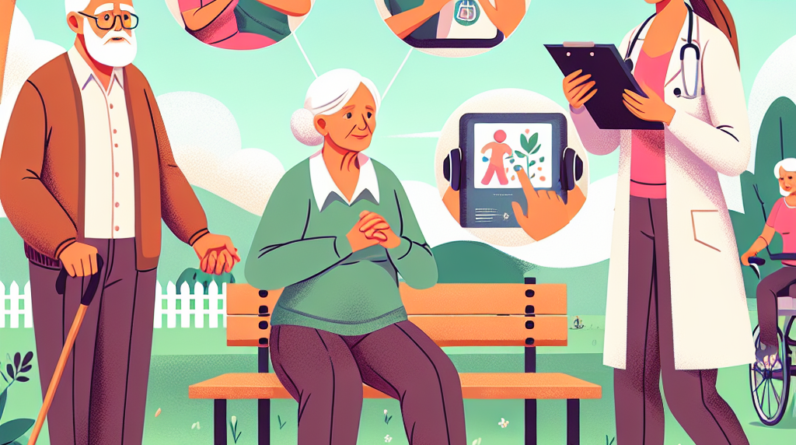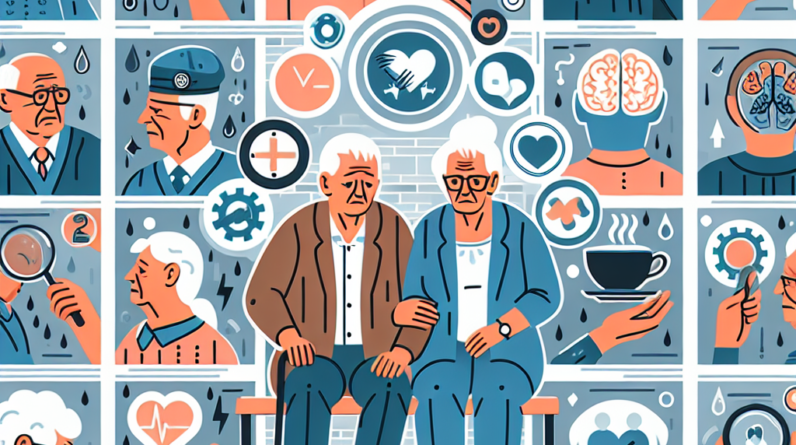
Living alone as an aging individual can present unique challenges, particularly when it comes to mental health. Issues such as loneliness, depression, and anxiety can become more prevalent in this stage of life, but there are ways to provide support. In this article, we will explore how you can help an elderly person who lives alone, offering practical and compassionate strategies for promoting their mental well-being. From encouraging social connections to fostering a sense of purpose, let’s discover the ways in which we can support these individuals in maintaining a healthy state of mind.
Supporting the Mental Health of Aging Individuals Living Alone

Understanding the Mental Health Challenges of Aging Individuals
As individuals grow older and transition into the phase of life where they live alone, there can be unique challenges that arise in terms of their mental health. Aging can bring about physical limitations, loss of loved ones, and changes in social dynamics, all of which can contribute to feelings of loneliness, isolation, and depression. It is important to understand the specific challenges faced by aging individuals in order to provide appropriate support and enhance their mental well-being.
The Importance of Social Support in Maintaining Mental Well-being
One of the crucial factors in maintaining good mental health for aging individuals living alone is the presence of social support. With the absence of daily interactions, conversations, and companionship, the risk of isolation and loneliness increases significantly. Social support can come in various forms, such as family members, friends, neighbors, or even community and support groups. Regular social interactions can not only provide a sense of belonging but also help alleviate depressive symptoms and enhance overall mental well-being.
Identifying Symptoms of Mental Health Issues in Aging Individuals
Recognizing and understanding the symptoms of mental health issues in aging individuals living alone is essential for providing appropriate care and support. Some common signs of mental health problems may include persistent sadness, loss of interest in activities, changes in appetite or sleep patterns, frequent feelings of hopelessness or worthlessness, and a decline in personal hygiene. It is important to be observant and attentive to any changes in behavior or mood and seek professional assistance when necessary.
Promoting Social Interaction and Engagement
Encouraging social interaction and engagement is vital for supporting the mental health of aging individuals living alone. Connecting with others through activities, hobbies, volunteering, or community events can help alleviate feelings of isolation and loneliness. Encourage participation in local senior centers, social clubs, or recreational groups that cater to their interests and provide opportunities for building new friendships and connections.

Encouraging Regular Communication and Check-ins
Regular communication and check-ins play a significant role in supporting the mental health of aging individuals living alone. Establishing a routine of reaching out to them through phone calls, video chats, or in-person visits can provide a sense of connection and reassurance. These interactions serve not only to combat feelings of isolation but also to identify any signs of distress, allowing for timely intervention and support.
Supporting the Formation of Support Networks
Facilitating the formation of support networks is crucial for aging individuals living alone. Encourage them to build relationships with neighbors, join local community groups, or attend support groups specifically designed for seniors. These networks can provide emotional support, companionship, and assistance during times of need. It is important to emphasize the value of having a reliable support system that can contribute to their mental well-being and overall quality of life.
Facilitating Access to Mental Health Services
Ensuring access to mental health services is an important aspect of supporting the mental health of aging individuals living alone. Encourage them to seek professional help, such as therapy or counseling services, if needed. Help them navigate the process of finding appropriate mental health resources and support them in attending appointments or sessions. Being proactive in facilitating access to mental health services can make a significant difference in their overall well-being.
Promoting Physical Activity and Exercise
Regular physical activity and exercise have been linked to improved mental health in people of all ages, including aging individuals living alone. Encourage them to engage in activities that promote movement and exercise, such as regular walks, gentle yoga, or tai chi. Physical activity not only helps enhance mood and overall well-being but also provides an opportunity for social interaction and engagement if done in group settings or classes.
Encouraging Healthy Eating Habits
Adopting and maintaining healthy eating habits can have a positive impact on the mental health of aging individuals living alone. Nutritious meals can provide the necessary fuel for both the body and mind, contributing to overall well-being. Encourage them to prioritize a balanced diet rich in fruits, vegetables, whole grains, and lean proteins. Additionally, involving them in meal planning, grocery shopping, or even cooking together can foster a sense of purpose, enjoyment, and engagement.
Fostering Meaningful Hobbies and Activities
Encouraging the development of meaningful hobbies and activities is essential for promoting the mental health of aging individuals living alone. Engaging in activities they enjoy, such as painting, gardening, reading, or crafting, can provide a sense of purpose, fulfillment, and joy. Encourage exploration of new interests and hobbies that align with their skills and passions. These activities not only serve as enjoyable pastimes but can also foster social connections and provide opportunities for personal growth.
Recognizing the Need for Professional Help and Intervention
Lastly, it is crucial to recognize when aging individuals living alone may require professional help and intervention. Sometimes, despite our best efforts, their mental health may deteriorate or reach a point where specialized care is necessary. In such cases, it is important to seek assistance from mental health professionals who are trained to navigate the complexities of aging-related mental health issues. Encourage open conversations about seeking professional help, and provide the necessary support in finding appropriate resources for their specific needs.
In conclusion, supporting the mental health of aging individuals living alone requires a comprehensive approach that addresses various aspects of their well-being. By understanding their unique challenges, providing social support, identifying symptoms of mental health issues, promoting social interaction and engagement, facilitating access to services, encouraging physical activity and healthy eating, fostering meaningful hobbies, and recognizing the need for professional help, we can contribute to the overall well-being and happiness of the aging population. Remember, your support and care can make a significant difference in their lives, helping them age gracefully and enjoy a fulfilling and mentally healthy life.







